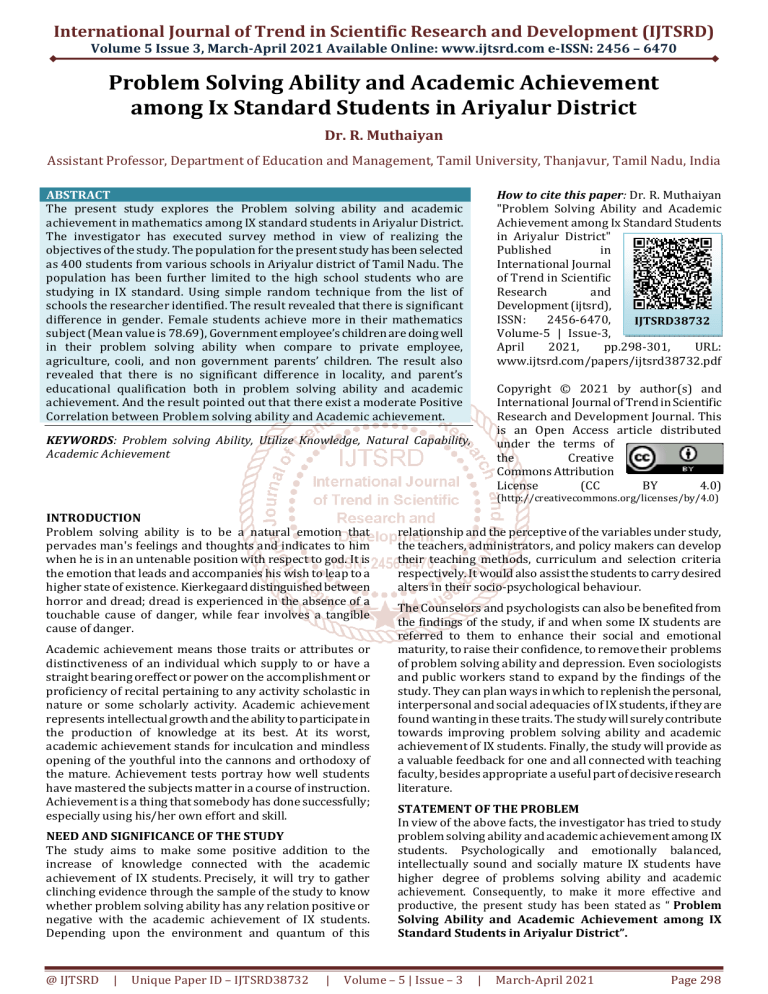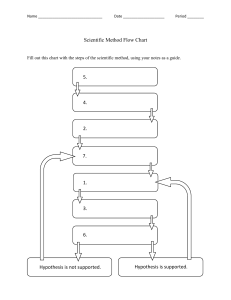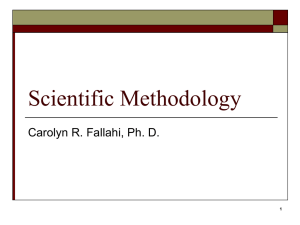
International Journal of Trend in Scientific Research and Development (IJTSRD)
Volume 5 Issue 3, March-April 2021 Available Online: www.ijtsrd.com e-ISSN: 2456 – 6470
Problem Solving Ability and Academic Achievement
among Ix Standard Students in Ariyalur District
Dr. R. Muthaiyan
Assistant Professor, Department of Education and Management, Tamil University, Thanjavur, Tamil Nadu, India
How to cite this paper: Dr. R. Muthaiyan
"Problem Solving Ability and Academic
Achievement among Ix Standard Students
in Ariyalur District"
Published
in
International Journal
of Trend in Scientific
Research
and
Development (ijtsrd),
ISSN:
2456-6470,
IJTSRD38732
Volume-5 | Issue-3,
April
2021,
pp.298-301,
URL:
www.ijtsrd.com/papers/ijtsrd38732.pdf
ABSTRACT
The present study explores the Problem solving ability and academic
achievement in mathematics among IX standard students in Ariyalur District.
The investigator has executed survey method in view of realizing the
objectives of the study. The population for the present study has been selected
as 400 students from various schools in Ariyalur district of Tamil Nadu. The
population has been further limited to the high school students who are
studying in IX standard. Using simple random technique from the list of
schools the researcher identified. The result revealed that there is significant
difference in gender. Female students achieve more in their mathematics
subject (Mean value is 78.69), Government employee’s children are doing well
in their problem solving ability when compare to private employee,
agriculture, cooli, and non government parents’ children. The result also
revealed that there is no significant difference in locality, and parent’s
educational qualification both in problem solving ability and academic
achievement. And the result pointed out that there exist a moderate Positive
Correlation between Problem solving ability and Academic achievement.
Copyright © 2021 by author(s) and
International Journal of Trend in Scientific
Research and Development Journal. This
is an Open Access article distributed
under the terms of
the
Creative
Commons Attribution
License
(CC
BY
4.0)
KEYWORDS: Problem solving Ability, Utilize Knowledge, Natural Capability,
Academic Achievement
(http://creativecommons.org/licenses/by/4.0)
INTRODUCTION
Problem solving ability is to be a natural emotion that
pervades man's feelings and thoughts and indicates to him
when he is in an untenable position with respect to god. It is
the emotion that leads and accompanies his wish to leap to a
higher state of existence. Kierkegaard distinguished between
horror and dread; dread is experienced in the absence of a
touchable cause of danger, while fear involves a tangible
cause of danger.
Academic achievement means those traits or attributes or
distinctiveness of an individual which supply to or have a
straight bearing oreffect or power on the accomplishment or
proficiency of recital pertaining to any activity scholastic in
nature or some scholarly activity. Academic achievement
represents intellectual growth and the ability to participate in
the production of knowledge at its best. At its worst,
academic achievement stands for inculcation and mindless
opening of the youthful into the cannons and orthodoxy of
the mature. Achievement tests portray how well students
have mastered the subjects matter in a course of instruction.
Achievement is a thing that somebody has done successfully;
especially using his/her own effort and skill.
NEED AND SIGNIFICANCE OF THE STUDY
The study aims to make some positive addition to the
increase of knowledge connected with the academic
achievement of IX students. Precisely, it will try to gather
clinching evidence through the sample of the study to know
whether problem solving ability has any relation positive or
negative with the academic achievement of IX students.
Depending upon the environment and quantum of this
@ IJTSRD
|
Unique Paper ID – IJTSRD38732
|
relationship and the perceptive of the variables under study,
the teachers, administrators, and policy makers can develop
their teaching methods, curriculum and selection criteria
respectively. It would also assist the students to carry desired
alters in their socio-psychological behaviour.
The Counselors and psychologists can also be benefited from
the findings of the study, if and when some IX students are
referred to them to enhance their social and emotional
maturity, to raise their confidence, to remove their problems
of problem solving ability and depression. Even sociologists
and public workers stand to expand by the findings of the
study. They can plan ways in which to replenish the personal,
interpersonal and social adequacies of IX students, if they are
found wanting in these traits. The study will surely contribute
towards improving problem solving ability and academic
achievement of IX students. Finally, the study will provide as
a valuable feedback for one and all connected with teaching
faculty, besides appropriate a useful part of decisive research
literature.
STATEMENT OF THE PROBLEM
In view of the above facts, the investigator has tried to study
problem solving ability and academic achievement among IX
students. Psychologically and emotionally balanced,
intellectually sound and socially mature IX students have
higher degree of problems solving ability and academic
achievement. Consequently, to make it more effective and
productive, the present study has been stated as “ Problem
Solving Ability and Academic Achievement among IX
Standard Students in Ariyalur District”.
Volume – 5 | Issue – 3
|
March-April 2021
Page 298
International Journal of Trend in Scientific Research and Development (IJTSRD) @ www.ijtsrd.com eISSN: 2456-6470
OBJECTIVES OF THE STUDY
The present investigation is undertaken with the following
objectives.
1. To study the problem solving ability of the students
belonging to different categories.
2. To examine, is there any relationship and difference
between of IX standard students and problem solving
ability.
3. To analyze the Mathematics achievement of IX standard
students belonging to different categories.
4. To correlate and compare the difference between the
problem solving ability and academic achievement.
HYPOTHESES OF THE STUDY
1. There is no significant difference between Gender of IX
students and their Problem Solving Ability and Academic
Achievement.
2. There is no significant difference between Locality of IX
students and their Problem Solving Ability and Academic
Achievement.
3. There is no significant difference between Parent
Educational Qualification of IX students and their
Problem Solving Ability and Academic Achievement.
4. There is no significant difference between Parent’s
Occupation of IX students and their Problem Solving
Ability and Academic Achievement.
5. There is no Correlation between the Problem Solving
Ability and Academic achievement.
RESEARH DESIGN
In the present study the researcher adopts descriptive
research design to explain record, analyze and interpret the
data.
TOOL USED IN THE STUDY
The standardized tool developed by L. N. Dubey for problem
solving ability of secondary students is used to evaluate
problem solving ability of IX students. The scale is five point
standardized scale and items of the scale are in
questionnaires form.
SAMPLING PROCEDURE
The IX students are selected by using random sampling
technique for the present study. The total sample size for the
present study is 400 IX standard students.
STATISTICAL TECHNIQUES USED
The following statistical techniques are used for the analysis
of data.
A. Descriptive statistics - mean and standard deviation
B. Differential statistics - 't' value and ‘F’ value
C. Correlation analysis – ‘r’ value
METHOD OF STUDY
In the present study normative survey research method is
adopted.
SCORING PROCEDURE
The problem solving ability of IX students is measured using
five point scale that represents strongly agree, agree,
neutral, disagree and strongly disagree. Academic
achievement score is based on the mathematics test in half
yearly.
PROCEDURE FOR ADMINISTRATION
The instructions regarding the method of answering are
clearly given in the tool. The subjects are properly motivated
so as to enable them to participate sincerely and give real
response. The subjects are requested and persuaded to go
through carefully and indicate their response in the answer
sheet. The tool is administrated with the subjects in different
schools on different dates personally by the investigator.
STATISTICAL ANALYSIS
Descriptive statistics such as percentages, mean and standard
deviation and inferential statistics such as `t` test, Analysis of
Variance(ANOVA) test and simple correlation analysis are
used for data analysis.
HYPOTHESIS NO.1
There is no significant difference between gender of IX
students and their Problem Solving Ability and Academic
Achievement.
This hypothesis was tested by using‘t’ test.
TEST OF SIGNIFICANT DIFFERENCE BETWEEN GENDER WITH RESPECT TO THEIR PROBLEM SOLVING ABILITY AND
ACADEMIC ACHIEVEMENT
Variable
Gender N Mean S.D
SED /M1-M2/ t Value Level of Significance
Male
200 66.88 9.75
Problem Solving Ability
0.9212
1.18
1.2809
Not Significant
Female 200 68.06 8.64
Male
200 73.24 10.74
Academic Achievement
1.0037
5.45
5.43
Significant at 0.01 level
Female 200 78.69 9.28
Critical Value for “t” at 0.05 level is 2.58 and at 0.01 level is 1.96
From the above table, it was clear that for Problem solving ability, the calculated t value was 1.2809. It was lower than the critical
value of “t”. Hence null hypothesis was accepted for Gender.
From the above table, it was clear that for Academic Achievement, the calculated t value was 5.43. It was greater than the cr itical
value of “t”. Hence null hypothesis was rejected for Gender.
HYPOTHESIS NO.2
There is no significant difference between Locality of IX students and their Problem Solving Ability and Academic Achievement.
This hypothesis was tested by using‘t’ test.
TEST OF SIGNIFICANT DIFFERENCE BETWEEN LOCALITY WITH RESPECT TO THEIR PROBLEM SOLVING ABILITY AND
ACADEMIC ACHIEVEMENT
Variable
Locality N Mean S.D
SED /M1-M2/ t Value Level of Significance
Rural
286 66.94 8.66
Problem Solving Ability
1.0088
0.12
0.1190
Not Significant
Urban 114 67.06 9.28
Rural
286 75.13 9.64
Academic Achievement
1.0324
0.74
0.7168
Not Significant
Urban 114 75.87 9.19
@ IJTSRD
|
Unique Paper ID – IJTSRD38732
|
Volume – 5 | Issue – 3
|
March-April 2021
Page 299
International Journal of Trend in Scientific Research and Development (IJTSRD) @ www.ijtsrd.com eISSN: 2456-6470
Critical Value for “t” at 0.05 level is 2.58 and at 0.01 level is 1.96
From the above table, it was clear that for problem solving ability, the calculated t value was 0.1190. It was lower than the critical
value of “t”. Hence null hypothesis was accepted for Locality.
From the above table, it was clear that for Academic Achievement, the calculated t value was 0.7168. It was greater than the
critical value of “t”. Hence null hypothesis was accepted for Locality.
HYPOTHESIS NO.3
There is no significant difference between parent educational qualification of IX students and their Problem Solving Ability
and Academic Achievement.
This hypothesis was tested by using ‘F’ test.
TEST OF SIGNIFICANT DIFFERENCE BETWEEN PARENT EDUCATIONAL QUALIFICATION WITH RESPECT TO THEIR
PROBLEM SOLVING ABILITY AND ACADEMIC ACHIEVEMENT
Variable
Source of Variance Sum of Squares df Mean Square F Ratio Level of Significance
Between Sample
443.45
3
147.82
Problem Solving Ability
Within Sample
36428.04
396
91.99
1.607
N.S
Total
36871.49
399
Between Sample
1498.75
3
499.58
Academic Achievement
Within Sample
201574.77
396
509.03
0.981
N.S
Total
203073.52
399
Critical Value for “F” at 0.05 level is 3.00 and at 0.01 level is 4.61
From the above table, it was clear that for problem solving ability, the calculated “F” value was 1.607. It was lower than the
critical value of “F”. Hence null hypothesis was accepted for parent educational qualification.
From the above table, it was clear that for Academic Achievement, the calculated “F” value was 0.981. It was lower than the
critical value of “F”. Hence null hypothesis was accepted for parent educational qualification.
HYPOTHESIS NO.4
There is no significant difference between parent’s occupation of IX students and their Problem Solving Ability and
Academic Achievement.
This hypothesis was tested by using ‘F’ test.
TEST OF SIGNIFICANT DIFFERENCE BETWEEN PARENT’S OCCUPATION WITH RESPECT TO THEIR PROBLEM SOLVING
ABILITY AND ACADEMIC ACHIEVEMENT
Variable
Source of Variance Sum of Squares df Mean Square F Ratio Level of Significance
Between Sample
2846.73
4
711.68
Problem Solving Ability
Within Sample
34024.76
395
86.14
8.26
0.01 Level
Total
36871.49
399
Between Sample
2160.72
4
540.18
Academic Achievement
Within Sample
200912.8
395
508.64
1.062
N.S
Total
203073.52
399
Critical Value for “F” at 0.05 level is 3.00 and at 0.01 level is 4.61
From the above table, it was clear that for problem solving ability, the calculated “F” value was 8.26. It was greater than the
critical value of “F”. Hence null hypothesis was rejected for parent’s occupation.
From the above table, it was clear that for Academic Achievement, the calculated “F” value was 0.981. It was lower than the
critical value of “F”. Hence null hypothesis was accepted for parent’s occupation.
CORRELATION
There is no correlation between the Problem Solving Ability and Academic Achievement.
CORRELATION BETWEEN PROBLEM SOLVING ABILITY AND ACADEMIC ACHIEVEMENT
Problem Solving Ability Academic Achievement
Problem Solving Ability
0.5836**
1
Academic Achievement
1
0.5836**
Critical Value at 0.05 level is 0.113 and at 0.01 level is 0.148
From the above table, it was clear that the calculated correlate value was 0.5836 which was greater than the critical value. Hence
the assumption was rejected. It is revealed that r-value for Problem solving ability with Academic achievement was 0.5836. The
result reveals that there exists a moderate Positive Correlation between Problem solving ability and Academic achievement.
MAJOR FINDINGS
The investigator applies the necessary statistical techniques
for analysis of data. The major findings of the study are:
The result revealed that there is significant difference in
@ IJTSRD
|
Unique Paper ID – IJTSRD38732
|
gender. Female students achieve more in their
mathematics subject (Mean value is 78.69)
Government employee’s children are doing well in their
problem solving ability when compare to private
Volume – 5 | Issue – 3
|
March-April 2021
Page 300
International Journal of Trend in Scientific Research and Development (IJTSRD) @ www.ijtsrd.com eISSN: 2456-6470
employee, agriculture, cooli, and non government
parents’ children.
The result also revealed that there is no significant
difference in locality, and parent’s educational
qualification both in problem solving ability and
academic achievement.
And the result pointed out that there exist a moderate
Positive Correlation between Problem solving ability and
Academic achievement.
SUGGESTIONS FOR FURTHER RESEARCH
1. The finding of the present study influenced the
investigator to suggest the following points for further
research.
2. Similar study can be undertaken in other districts of
Tamil Nadu.
3. Similar study can be undertaken on primary, middle and
higher secondary students in Tamil Nadu.
4. Similar study can be undertaken in order to find out
factors influencing problem solving abilities of IX
students.
5. Interaction effect of economic status and students
studying at different levels of education (primary,
secondary and higher) on their problem solving ability
and academic achievement can be taken into
consideration for further studies.
6. Study may be extended to larger sample drawn from the
Tamil Nadu state as a whole.
CONCLUSION
The above findings reveal that the IX students can
understand the extent of problem solving ability. It is also
seen that problem solving ability of IX students are influence
to their Academic Achievement. In restricted sense only the
IX students are utilizing knowledge in their day to day
problem solving ability. Hence, this study concludes that
problem solving ability of IX students still to be effectively
improved, monitored, encouraged and modified from time to
time to go on par with the developed states in our country.
REFERENCES
[1] Adnan Kan, AhmetAkbas (2005), Attributions for
Academic Success in chemistry: An individual
difference investigation of problem solving in the
science subject and Academic Achievement and
Gender, Journal of Psycho-educational Assessment,
Vol.12 (1), pp.4-13.
[2]
Ahamad, N. Raheem, A. (2017) A study of chemistry
in relation to problem solving for academic
achievement of College students, Journal of Education
and Extension, Vol. 17(2), pp. 11-17.
@ IJTSRD
|
Unique Paper ID – IJTSRD38732
|
[3]
Darchingpui, A. (2006).A study of science
achievement, science attitude and problem solving
ability among school students in Aizawl. Fifth Survey
of Educational Research, 2, N.C .E.R.T., New Delhi.
[4]
Gomathi (2010) Academic achievement and problem
solving Patterns of coping with psychological
stressors among Indian Adolescents, journal of Skills
development and education Vol.12 (1), pp.9-15.
[5]
Herrings Rita. I. (2007) A Study of some factors
affecting student involvement in studies and
Problem solving ability skills, Journal of Educational
Research, Vol.15 (3), pp.70-73.
[6]
Howell, Byron Edward (2012) Achievement of
academic and School grades Educational and
Psychological Measurement, 46, pp.1071-1074.
[7]
Kumar, S. and Avaradi, S. S. (2009).Problem solving
ability and academic achievement among SC/ST
students in Gulbarga district. Indian Streams
Research Journal, 4 (9 ) ,1-5.
[8]
MadhuGupta, PoojaPasrija And Kavita (2005) Effect
Of Prolem Solving Ability On Academic Achievement
Of High School Students: A Comparative Study
Bhartiyam International Journal Of Education &
Research A Quarterly Peer Reviewed International
Journal Of Research & Education Volume 4, Issue Ii,
March 2005, Issn:2277-1255
[9]
Michal Drechsler and Jan Van Driel (2009) Problem
solving in Teaching Psychological Defenses, An
interactive computerized programme teaching of
Psychology, 14 (1), pp. 35-37.
[10]
Pushpam, (2016) Acdamic Guidance style in the
teaching process and social achievement of Problem
solving ability skills, Psychologia , 22, pp. 240-247.
[11]
Raja Lakshmi (2018) Gender differences in learning
problem solving patterns: A review of literature. J.
International Edu., 8(2):187-203.
[12]
SweetlinLeelavathy, (2012) Coping with stressful
events in older children and young adolescents of
problem solving in ability, Journal of Consulting and
Clinical Psychology, 56 (3), pp.405-411.
[13]
Walker, S., Irving, K., and Berthelsen, D., 2013, Gender
influences on preschool children’s social problem
solving strategies. J. Genetic Psychol., 163(2):197-209.
Volume – 5 | Issue – 3
|
March-April 2021
Page 301





